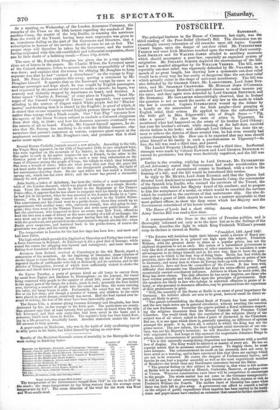POSTSCRIPT.
SATURDAY.
The principal business in the House of Commons, last night, was the third reading of the Poor-Relief (Ireland) Bill. The discussion was an exceedingly cursory reiteration of old remarks upon old topics. Captain CORRY began, upon the danger of out-door relief. Mr. FITZSTEPHEN Famecu and some Irish Members touched upon the wants of their country. Lord JOCELYN and Sir WALTER JAMES alluded to auxiliary measures which should accompany a poor-law, especially an organized system of emigration. Mr. POULETT Scaoeu deplored the shortcomings of the bill; and it was assailed altogether by Sir Wu,u_sia VERNER. The bill, more especially out-door relief, was vigorously defended by Mr. Vuxuras, in a speech of no great length, but showing how a systematic out-door relief would be in every way far less costly or dangerous than the out-door relief which actually exists in the shape of universal mendicancy. The bill was also defended by Sir GEORGE GREY, Mr. LABOUCHERE, Lord Josue Rue- SELL, and Mr. &usual( CRAWFORD. Mr. MORGAN Joint O'CoNaErs. attacked Lord George Bentinck's attempted clauses to make tenants pay the rates; and they again were defended by Lord GEORGE BENTINCK and Mr. DISRAELI. Mr. Gonuarmsi admonishingly observed, that in Ireland the question is not so much the merits of any law as the mode in which the law is executed. Captain FITZILAIIRICE wound up the debate by a homily on the misconduct of the Irish people—their grasping at English relief, their crimes. He applied to them the exhortation of the little girl in Miss Edgeworth's tale of Simple Susan — " Pig, take a spoon." To show the state of crime in Tipperary, he mentioned what had happened on the estate of his brother Lord Orkney: last year his brother's servant, while standing at the hall-door, received eleven bullets in his body; and although Lord Orkney has done the ut- most to relieve the distress of those around him, he has even recently had notices threatening his life. How can it be expected that any man should place himself or his family in such a pandemonium as Tipperary?—In fine, the bill was read a third time, and passed.
The Landed Property (Ireland) Bill was read a third time. Ineffectual attempts were made by Colonel RAWDON and Lord GEORGE Braemar to extend its provisions; but they were decisively negatived, and the bill was passed.
Earlier in the evening, replying to Lord DErNcist, Mr. RDTHERFURD (Lord Advocate) stated that Government had under consideration the subject of the sale of encumbered estates in Scotland, with a view to the framing of a bill and the bill would be introduced this session. In reply to dr. Murat, Lord Joust RUSSELL said that the Queen had directed Lord Auckland to express to Don Bernardo Camp, the commander of the Spanish brig Emilio, who rescued the survivors of the Tweed, the satisfaction with which her Majesty heard of his conduct; and to propose to him the acceptance of a medal, on which would be recorded the services which he rendered to the survivors of that unfortunate ship. She also di- rected that a grant of 500/. should be made in a manner acceptable to that most gallant officer, to show the deep sense which her Majesty and the Government entertained of his heroic conduct.
The House of Lords had a short sitting. Among other business, the Army Service Bill was read a first time.


























 Previous page
Previous page